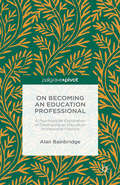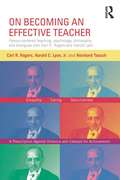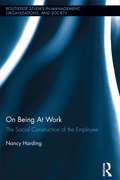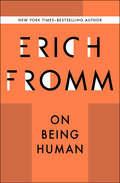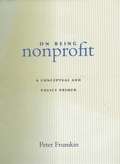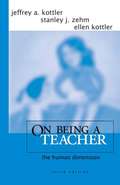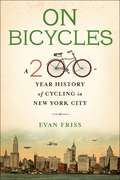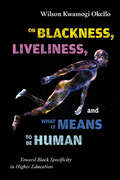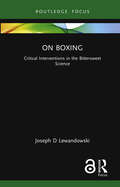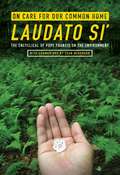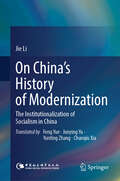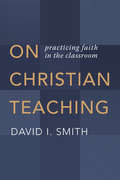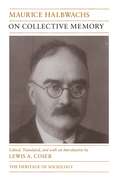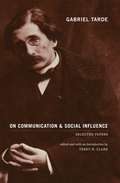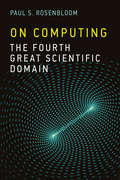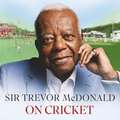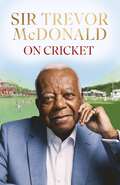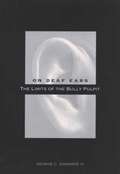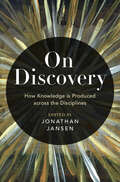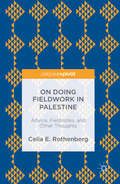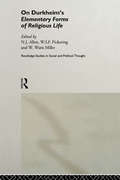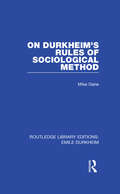- Table View
- List View
On Becoming an Education Professional: A Psychosocial Exploration Of Developing An Educational Professional Practice
by Alan BainbridgeThis book draws together a variety of detailed case studies to demonstrate the unique interaction between the past and the present which occurs within the professional education context. Using a psychosocial approach, Alan Bainbridge suggests that this process of identity or role formation requires the expectations and fantasies of the past to be negotiated at the unconscious, individual and social level. A focus on personal agency and dealing with the complexity inherent in education settings highlights the macro and micro negotiations new education professionals are required to undertake between the margins of the personal and professional to provide a more nuanced model for early professional development.
On Becoming an Effective Teacher: Person-centered teaching, psychology, philosophy, and dialogues with Carl R. Rogers and Harold Lyon
by Carl R Rogers Harold C Lyon Reinhard TauschOn Becoming an Effective Teacher describes exemplary practices like Teach For America, which highlight the power of person-centered teaching to bring about higher student achievement and emotional intelligence. Lyon situates the classic with the cutting-edge, integrating wisdom with research, anecdote with practical advice, to find truths that reveal paths toward effective teaching. Jeffrey Cornelius-White, Psy.D., LPC, Professor of Counseling, Missouri State University, USA, Author of Learner Centered Instruction: Building Relationships for Student Success This fascinating book reveals through current research and contemporary applications that Carl Rogers’ pioneering and radical approach to education is as relevant today as it was in the 1970s and ‘80s. Brian Thorne, University of East Anglia, UK Carl Rogers is one of the most influential psychologists of the twentieth century. His influence is similarly outstanding in the fields of education, counselling, psychotherapy, conflict resolution, and peace. On Becoming an Effective Teacher presents the final unpublished writings of Rogers and as such has, not only unique historical value, but also a vital message for today’s educational crises, and can be read as a prescription against violence in our schools. It documents the research results of four highly relevant, related but independent studies which comprise the biggest collection of data ever accumulated to test a person-centred theory in the field of education. This body of comprehensive research on effective teaching was accomplished over a twenty-year period in 42 U.S. States and in six other countries including the UK, Germany, Brazil, Canada, Israel, and Mexico and is highly relevant to the concerns of teachers, psychologists, students, and parents. The principal findings of the research in this book show that teachers and schools can significantly improve their effectiveness through programs focusing on facilitative interpersonal relationships. Teachers who either naturally have, or are trained to have empathy, genuineness (congruence), and who prize their students (positive regard) create an important level of trust in the classroom and exert significant positive effects on student outcomes including achievement scores, interpersonal functioning, self-concept, attendance, and violence. The dialogues between Rogers and Lyon offer a unique and timeless perspective on teaching, counselling and learning. The work of Reinhard Tausch on person-centered teaching for counselors, parents, athletics, and even textbook materials, and the empathic interactions of teachers and students, is among the most thorough and rigorous research ever accomplished on the significance and potential of a person-centered approach to teaching and learning. This pioneering textbook is highly relevant to educational psychologists and researchers, as well as those in undergraduate and graduate university courses in education, teacher training, counseling, psychology and educational psychology.
On Being At Work: The Social Construction of the Employee (Routledge Studies in Management, Organizations and Society #21)
by Nancy HardingInspired by the work of the philosopher Judith Butler, influenced by Marx’s theory of alienation and intrigued by theories of death, this book develops an anti-methodological approach to studying working lives. Distinctions are drawn between labour (the tasks we do in our jobs) and work (self-making activities that are carried out at the workplace): between the less than human, zombie-like laborer and the working human self. Nancy Harding argues that the experience of being at work is one in which the insistence on practising one’s humanity always provides a counter-point to organisational demands.
On Being Human
by Erich FrommAn insightful look at alienation in the modern world from the New York Times–bestselling author of The Art of Loving and Escape from Freedom. Social psychologist Erich Fromm observed the spread of alienation in the 1960s, arguing that humans who were once dynamic, creative beings were reduced to fixating on TV screens, emotionally paralyzed by anxieties over threats like nuclear war. Though we may stare at different devices and worry about other dangers today, his insights are as useful as ever, and allow us to gain perspective on the human condition. A collection of his writings on &“New Humanism&” and the need to reclaim our happiness and peace of mind, this is a thoughtful, fascinating overview of the past that shaped us, and the philosophies and practices that can ensure a better future, both for ourselves and for the world at large. Included are reflections on thinkers from Karl Marx to medieval Catholic mystic Meister Eckhart, as &“Fromm&’s large, keen mind and attractive, likable voice [strive] for heart as he asks himself the hardest questions of his day&” (Kirkus Reviews). This ebook features an illustrated biography of Erich Fromm including rare images and never-before-seen documents from the author&’s estate.
On Being Human
by Erich FrommAn insightful look at alienation in the modern world from the New York Times–bestselling author of The Art of Loving and Escape from Freedom. Social psychologist Erich Fromm observed the spread of alienation in the 1960s, arguing that humans who were once dynamic, creative beings were reduced to fixating on TV screens, emotionally paralyzed by anxieties over threats like nuclear war. Though we may stare at different devices and worry about other dangers today, his insights are as useful as ever, and allow us to gain perspective on the human condition. A collection of his writings on &“New Humanism&” and the need to reclaim our happiness and peace of mind, this is a thoughtful, fascinating overview of the past that shaped us, and the philosophies and practices that can ensure a better future, both for ourselves and for the world at large. Included are reflections on thinkers from Karl Marx to medieval Catholic mystic Meister Eckhart, as &“Fromm&’s large, keen mind and attractive, likable voice [strive] for heart as he asks himself the hardest questions of his day&” (Kirkus Reviews). This ebook features an illustrated biography of Erich Fromm including rare images and never-before-seen documents from the author&’s estate.
On Being Nonprofit: A Conceptual and Policy Primer
by Peter FrumkinThis concise and illuminating book provides a road map to the evolving conceptual and policy terrain of the nonprofit sector. Drawing on prominent economic, political, and sociological explanations of nonprofit activity, Peter Frumkin focuses on four important functions that have come to define nonprofit organizations. The author clarifies the debate over the underlying rationale for the nonprofit and voluntary sector's privileged position in America by examining how nonprofits deliver needed services, promote civic engagement, express values and faith, and channel entrepreneurial impulses. He also exposes the difficult policy questions that have emerged as the boundaries between the nonprofit, business, and government sectors have blurred. Focusing on nonprofits' growing dependence on public funding, tendency toward political polarization, often idiosyncratic missions, and increasing commercialism, Peter Frumkin argues that the long-term challenges facing nonprofit organizations will only be solved when they achieve greater balance among their four central functions. By probing foundational thinking as well as emergent ideas, the book is an essential guide for nonprofit novitiates and experts alike who want to understand the issues propelling public debate about the future of their sector. By virtue of its breadth and insight, Frumkin's book will be an invaluable resource for anyone interested in understanding the complex interplay of public purposes and private values that animate nonprofit organizations.
On Being Rich and Poor
by Jacques Ellul Willem H. VanderburgOne of the most original thinkers of the twentieth century, Jacques Ellul (1912-1994) was a French law professor, sociologist, lay theologian, and self-described "Christian anarchist." Collecting Ellul's lectures on the Bible, On Being Rich and Poor contains his prescient meditations on some of the most important theological questions of the modern age. In this volume, a follow-up to the Ellul lectures collected in On Freedom, Love, and Power, Ellul asks how it is that Christianity can justify abandoning the poorest, weakest, and most vulnerable members of society, depriving the next generation of a liveable future, and participating in an unprecedented wave of environmental destruction.In these talks, Ellul observes that some of the harshest language in the Jewish and Christian Bibles is reserved for those who are rich and powerful, and thus able to bend others to their will. Through his analysis of the prophetic vision of Amos and the epistle of James, Ellul exposes the gap between the principles of Christian life and the practices of the modern world. Critiquing a world that values domination over collaboration, he offers an alternative path.Transcribed from the original recordings and translated by Willem H. Vanderburg, a student and long-time colleague of Ellul's, On Being Rich and Poor is an unprecedented look at how one of the twentieth century's foremost thinkers grappled with some of today's most challenging issues.
On Being a Teacher: The Human Dimension
by Jeffrey A. Kottler Ellen Kottler Stanley J. ZehmOn Being a Teacher links teaching to the unique human characteristics that each person possesses. Written with the preservice, beginning, and veteran teacher in mind, the authors help educators discover their own special traits that make them superlative teachers. This book covers: Research-based teaching strategies Professional development activities An in-depth look at parent-teacher conferences Ideas for getting involved in your school and district to further professional growth Information on learning styles and multiple intelligences Guides for individual and group reflection This book is ideal for teacher education courses and induction programs and can be used for either individual growth or group study.
On Bicycles: A 200-Year History of Cycling in New York City
by Evan FrissSubways and yellow taxis may be the icons of New York transportation, but it is the bicycle that has the longest claim to New York’s streets: two hundred years and counting. Never has it taken to the streets without controversy: 1819 was the year of the city’s first bicycle and also its first bicycle ban. Debates around the bicycle’s place in city life have been so persistent not just because of its many uses—recreation, sport, transportation, business—but because of changing conceptions of who cyclists are. In On Bicycles, Evan Friss traces the colorful and fraught history of cycling in New York City. He uncovers the bicycle’s place in the city over time, showing how it has served as a mirror of the city’s changing social, economic, infrastructural, and cultural politics since it first appeared. It has been central, as when horse-drawn carriages shared the road with bicycle lanes in the 1890s; peripheral, when Robert Moses’s car-centric vision made room for bicycles only as recreation; and aggressively marginalized, when Ed Koch’s battle against bike messengers culminated in the short-lived 1987 Midtown Bike Ban. On Bicycles illuminates how the city as we know it today—veined with over a thousand miles of bicycle lanes—reflects a fitful journey powered, and opposed, by New York City’s people and its politics.
On Blackness, Liveliness, and What It Means to Be Human: Toward Black Specificity in Higher Education (SUNY series, Critical Race Studies in Education)
by Wilson Kwamogi OkelloIn "No Humans Involved: An Open Letter to My Colleagues," Jamaican writer and theorist Sylvia Wynter critiques the social and human sciences for perpetuating social hierarchies, particularly through the Western humanist framing of "Man" as the universal representation of humanity. Human development theories revolve around this concept, necessitating acquiescence to the category Man to claim humanity. But Blackness complicates and unsettles these terms in ways the fields of higher education and educational research are in many ways just beginning to confront.On Blackness, Liveliness, and What It Means to Be Human extends Wynter's critique to human development and academic knowledge production, arguing that Black specificity can create new possibilities for Black being. Wilson Kwamogi Okello closely examines holistic development theory, aiming not to reform but to reimagine the "self" it presupposes. Taking what he describes as a multimodal and multisensory approach, Okello engages a chorus of writers, thinkers, and cultural workers—Baldwin, Bambara, Brand, Hartman, Lorde, Sharpe, Spillers, Wilderson, and more—to reframe Blackness as a social, political, and historical matrix, going beyond the study of Black experiences, biology, or culture. Punctuated throughout by stunning images from artist Mikael Owunna's "Infinite Essence" series, the book proposes and enacts a methodological attunement to Blackness that can guide theory, policy, and practice toward an alternative praxis for the benefit of Black living.
On Boxing: Critical Interventions in the Bittersweet Science (Routledge Focus on Sport, Culture and Society)
by Joseph D LewandowskiThis book is a philosophical and cultural critique of contemporary boxing. It broadens and deepens our understanding of the empirically and normatively entwined complexities of a sport that is often misunderstood and all too easily reduced to stereotypes. Moving between and among work in ethnography, sociology, urban studies and, especially, the philosophy of sport, and drawing on research in boxing gyms in the US, the book presents a stereoscopic view of professional boxing as both situated cultural practice and formalized competitive sport. It takes us inside and outside the ring in discussions of the cultural embeddedness of boxing and boxing gyms, the formation of pugilistic selfhood and ‘boxer cool’, the nature and function of combat sport violence and sparring, and the aesthetics and ethics of cornering a boxing match. With its interdisciplinary focus on the empirical and normative dimensions of professional pugilism, On Boxing makes explicit the bittersweetness of the ‘sweet science’ and provides a new theoretical framework for analysing boxing and, indeed, sport in general. Written for a broad audience, this is important reading for scholars and students working in the areas of philosophy and sociology of sport and combat sport studies, as well as policy makers, coaches, and commentators engaged in the sport of boxing.
On Care for Our Common Home Laudato Si': The Encyclical of Pope Francis on the Environment (Ecology And Justice)
by Pope Francis Sean McDonaghLaudato Si', Pope Francis's historic encyclical on the environment, was issued in 2015. As the first encyclical devoted entirely to the environment and related social justice issues, it represented a watershed in the church's engagement with such urgent challenges as climate change, environmental degradation, and the fate of the poor. This volume joins the full text of Laudato Si' with reflections by Sean McDonagh, one of the foremost Catholic proponents of ecological awareness. Aside from reviewing the history of Catholic teaching and the environment, he elaborates on several of the specific themes in the encyclical--climate change, biodiversity, water scarcity, the threats to the ocean, and the crisis of food. He concludes with prescriptions about what must be done to turn the pope's vision into a program of effective action. Each of us has a role to play. As Pope Francis observes, "All it takes is one good person to restore hope."
On China’s History of Modernization: The Institutionalization of Socialism in China
by Jie LiThis book offers a comprehensive understanding of the developments in the modern Chinese history since the Opium War in 1840, by reflecting on the history of the Communist Party of China, the history of China since 1949, the history of the economic reform and opening up, and the history of China’s socialist institutional construction respectively. Taking time as the warp and events as the weft, it tries to summarize the fundamental changes across the past 200 years in China, which the author believes have been a glorious journey from poverty and weakness to rejuvenation. In context, this book tries to rationalize the formation of the governing laws of the Communist Party of China, the laws of socialist construction, and the laws of human historical development. It aims to provide a perspective for the international community to understand China’s fundamental ideal of peaceful development.
On Christian Teaching: Practicing Faith in the Classroom
by David I. SmithChristian teachers have long been thinking about what content to teach, but little scholarship has been devoted to how faith forms the actual process of teaching. Is there a way to go beyond Christian perspectives on the subject matter and think about the teaching itself as Christian? In this book David I. Smith shows how faith can and should play a critical role in shaping pedagogy and the learning experience.
On Christian Teaching: Practicing Faith in the Classroom
by David I. SmithChristian teachers have long been thinking about what content to teach, but little scholarship has been devoted to how faith forms the actual process of teaching. Is there a way to go beyond Christian perspectives on the subject matter and think about the teaching itself as Christian? In this book David I. Smith shows how faith can and should play a critical role in shaping pedagogy and the learning experience.
On Collective Memory (The Heritage of Sociology)
by Maurice HalbwachsHow do we use our mental images of the present to reconstruct our past? Maurice Halbwachs (1877-1945) addressed this question for the first time in his work on collective memory, which established him as a major figure in the history of sociology. This volume, the first comprehensive English-language translation of Halbwach's writings on the social construction of memory, fills a major gap in the literature on the sociology of knowledge.Halbwachs' primary thesis is that human memory can only function within a collective context. Collective memory, Halbwachs asserts, is always selective; various groups of people have different collective memories, which in turn give rise to different modes of behavior. Halbwachs shows, for example, how pilgrims to the Holy Land over the centuries evoked very different images of the events of Jesus' life; how wealthy old families in France have a memory of the past that diverges sharply from that of the nouveaux riches; and how working class construction of reality differ from those of their middle-class counterparts. With a detailed introduction by Lewis A. Coser, this translation will be an indispensable source for new research in historical sociology and cultural memory. Lewis A. Coser is Distinguished Professor of Sociology Emeritus at the State University of New York and Adjunct Professor of Sociology at Boston College.
On Communication and Social Influence: Selected Papers
by Gabriel TardeGabriel Tarde ranks as one of the most outstanding sociologists of nineteenth-century France, though not as well known by English readers as his peers Comte and Durkheim. This book makes available Tarde’s most important work and demonstrates his continuing relevance to a new generation of students and thinkers. Tarde’s landmark research and empirical analysis drew upon collective behavior, mass communications, and civic opinion as elements to be explained within the context of broader social patterns. Unlike the mass society theorists that followed in his wake, Tarde integrated his discussions of societal change at the macrosocietal and individual levels, anticipating later twentieth-century thinkers who fused the studies of mass communications and public opinion research. Terry N. Clark’s introduction, considered the premier guide to Tarde’s opus, accompanies this important work, reprinted here for the first time in forty years.
On Computing: The Fourth Great Scientific Domain
by Paul S. RosenbloomA proposal that computing is not merely a form of engineering but a scientific domain on a par with the physical, life, and social sciences.Computing is not simply about hardware or software, or calculation or applications. Computing, writes Paul Rosenbloom, is an exciting and diverse, yet remarkably coherent, scientific enterprise that is highly multidisciplinary yet maintains a unique core of its own. In On Computing, Rosenbloom proposes that computing is a great scientific domain on a par with the physical, life, and social sciences. Rosenbloom introduces a relational approach for understanding computing, conceptualizing it in terms of forms of interaction and implementation, to reveal the hidden structures and connections among its disciplines. He argues for the continuing vitality of computing, surveying the leading edge in computing's combination with other domains, from biocomputing and brain-computer interfaces to crowdsourcing and virtual humans to robots and the intermingling of the real and the virtual. He explores forms of higher order coherence, or macrostructures, over complex computing topics and organizations. Finally, he examines the very notion of a great scientific domain in philosophical terms, honing his argument that computing should be considered the fourth great scientific domain.With On Computing, Rosenbloom, a key architect of the founding of University of Southern California's Institute for Creative Technologies and former Deputy Director of USC's Information Sciences Institute, offers a broader perspective on what computing is and what it can become.
On Cricket
by Sir Trevor McDonaldSir Trevor McDonald is one of Britain's most celebrated broadcasters and his devotion for cricket is almost as well-known as his legendary professional achievements.In this inspirational memoir, On Cricket, Sir Trevor explores his childhood in the Caribbean and celebrates his life-long love of the sport that followed him no matter where in the world his illustrious journalistic career would take him.Sir Trevor offers a wide-ranging commentary on cricket as a common language between England, the West Indies and beyond - a sense of belonging that knows no borders - and celebrates cricket as an engine of national identity and an essential feature of daily life and community.An exceptional storyteller and commentator, On Cricket is a love letter to the sport and a study of Sir Trevor's oldest and most consistent passion: watching, debating and playing the gentleman's game.
On Cricket
by Sir Trevor McDonaldSir Trevor McDonald is one of Britain's most celebrated broadcasters and his devotion for cricket is almost as well-known as his legendary professional achievements.In this inspirational memoir, On Cricket, Sir Trevor explores his childhood in the Caribbean and celebrates his life-long love of the sport that followed him no matter where in the world his illustrious journalistic career would take him.Sir Trevor offers a wide-ranging commentary on cricket as a common language between England, the West Indies and beyond - a sense of belonging that knows no borders - and celebrates cricket as an engine of national identity and an essential feature of daily life and community.An exceptional storyteller and commentator, On Cricket is a love letter to the sport and a study of Sir Trevor's oldest and most consistent passion: watching, debating and playing the gentleman's game.
On Deaf Ears: The Limits of the Bully Pulpit
by George C. EdwardsAmerican presidents often engage in intensive campaigns to obtain public support for their policy initiatives. This core strategy for governing is based on the premise that if presidents are skilled enough to exploit the "bully pulpit," they can successfully persuade or even mobilize public opinion on behalf of their legislative goals. In this book, George Edwards analyzes the results of hundreds of public opinion polls from recent presidencies to assess the success of these efforts. Surprisingly, he finds that presidents typically are not able to change public opinion; even great communicators usually fail to obtain the public's support for their high-priority initiatives. Focusing on presidents' personae, their messages, and the American public, he explains why presidents are often unable to move public opinion and suggests that their efforts to do so may be counterproductive. Edwards argues that shoring up previously existing support is the principal benefit of going public and that "staying private"--negotiating quietly with elites-may often be more conducive to a president's legislative success.
On Discovery: How Knowledge is Produced across the Disciplines
by Jonathan JansenHow is new knowledge produced in the social, natural, and biomedical sciences? What is the role of serendipity versus planning? How has technology changed knowledge production, from AI to large datasets? This book presents insights into the pursuit of new knowledge from fields as diverse as medicine, engineering, linguistics, and theology. Over twenty researchers and scientists describe the modalities of discovery in their disciplines, offering a diverse survey of the social norms and politics of knowledge. Written in nontechnical language, this collection is designed to make research practices from widely different domains comprehensible to each other. A generative synthesis in the final chapter offers new insights into how discovery happens and its consequences for science and society. On Discovery will be essential reading for anyone interested in philosophical and social dimensions of knowledge.
On Doing Fieldwork in Palestine
by Celia E. RothenbergThis book, based on the author's ethnographic fieldwork in the Palestinian West Bank from 1995 to 1996, aims to provide an honest, authentic, and accurate accounting of the nitty-gritty, day-to-day challenges, rewards, failures, and successes of doing fieldwork in a conservative village setting. By focussing on the intimate, typically obscured aspects of the fieldwork experience this memoir is intended for students planning to do fieldwork in any locale.
On Durkheim's Elementary Forms of Religious Life (Routledge Studies in Social and Political Thought #No.10)
by W. S. F. Pickering N. J. Allen W. Watts MillerThis is the first collection of essays to be published on Durkheim's masterpiece The Elementary Forms of Religious Life. It represents the work of the most important international Durkheim scholars from the fields of anthropology, philosophy and sociology. The essays focus on key topics including:* the method Durkheim adopted in his study* the role of ritual and belief in society* the nature of contemporary religionThe contributors also explore cutting-edge debates about the notion of the soul and collective rituals.
On Durkheim's Rules of Sociological Method (Routledge Library Editions: Emile Durkheim)
by Mike GaneThis radical appraisal of Durkheim's method, first published in 1988, argues that fundamental errors have been made in interpreting Durkheim. Mike Gane argues that to understand The Rules it is necessary also to understand the context of the French society in which the book was written. He explores the cultural and philosophical debates which raged in France during the period when Durkheim prepared the book and establishes the real and unsuspected complexity of Durkheim's position: its formal complexity, its epistemological complexity, and its historical complexity.
